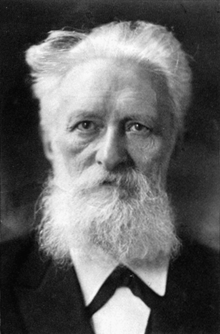Rudolf Christoph Eucken
| Rudolf Christoph Eucken | |
|---|---|
 |
|
| Born |
5 January 1846 Aurich, Kingdom of Hanover, Germany |
| Died | 15 September 1926 (aged 80) Jena, Thuringia, Germany |
| Alma mater |
Göttingen University Berlin University |
| Awards | Nobel Prize in Literature (1908) |
| Era | 19th- and 20th-century philosophy |
| Region | Western philosophy |
| School |
Continental philosophy German Idealism |
| Institutions | NYU, University of Jena |
|
Main interests
|
Ethics |
|
Notable ideas
|
Aktivismus (ethical activism) The Real |
|
Influences
|
|
| Signature | |
Rudolf Christoph Eucken (German: [ˈɔʏkn̩]; 5 January 1846 – 15 September 1926) was a German philosopher. He received the 1908 Nobel Prize for Literature "in recognition of his earnest search for truth, his penetrating power of thought, his wide range of vision, and the warmth and strength in presentation with which in his numerous works he has vindicated and developed an idealistic philosophy of life", after he had been nominated by a member of the Swedish Academy.
Eucken was born on 5 January 1846 in Aurich, then in the Kingdom of Hanover (now Lower Saxony). His father, Ammo Becker Eucken (1792–1851) died when he was a child, and he was brought up by his mother, Ida Maria (1814–1872, née Gittermann). He was educated at Aurich, where one of his teachers was the classical philologist and philosopher Ludwig Wilhelm Maximilian Reuter (1803–1881). He studied at Göttingen University (1863–66), where Hermann Lotze was one of his teachers, and Berlin University. In the latter place, Friedrich Adolf Trendelenburg was a professor whose ethical tendencies and historical treatment of philosophy greatly attracted him.
Eucken received his Ph.D. in classical philology and ancient history at Göttingen University in 1866 with a dissertation under the title De Aristotelis dicendi ratione. However, the bent of his mind was definitely towards the philosophical side of theology. In 1871, after five years working as a school teacher at Husum, Berlin und Frankfurt, he was appointed Professor of Philosophy at the University of Basel, Switzerland, succeeding another of his former teachers at Göttingen, Gustav Teichmüller. He stayed there until 1874 when he took up a similar position at the University of Jena. He stayed there until he retired in 1920. From 1913–1914 he served as guest lecturer at New York University. During World War I, Eucken, like many of his academic colleagues, took a strong line in favour of the causes with which his country had associated itself.
...
Wikipedia
